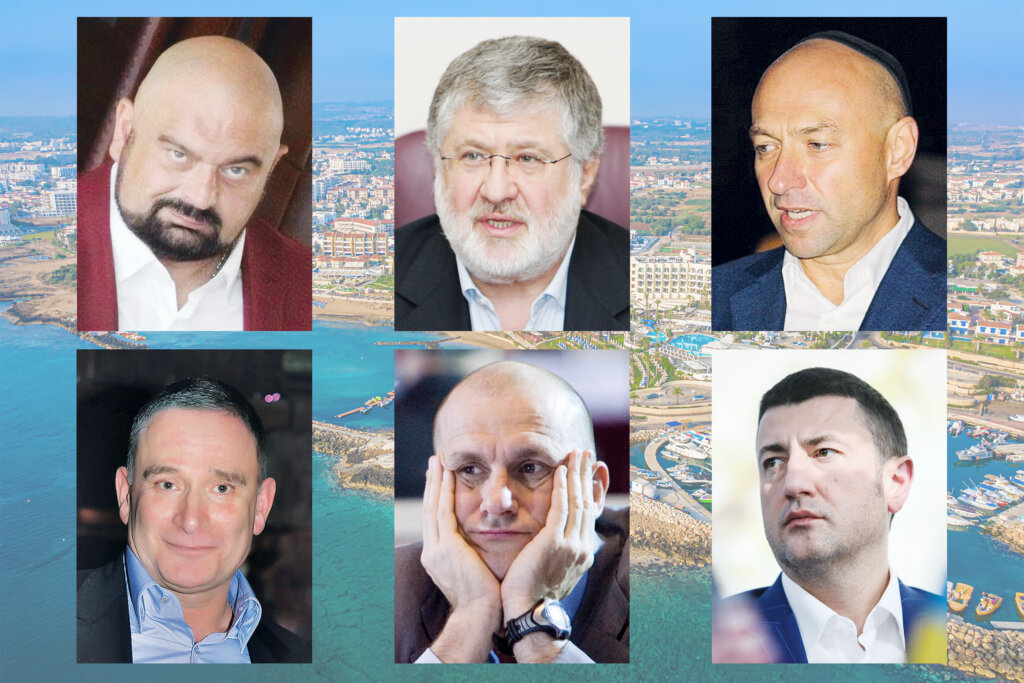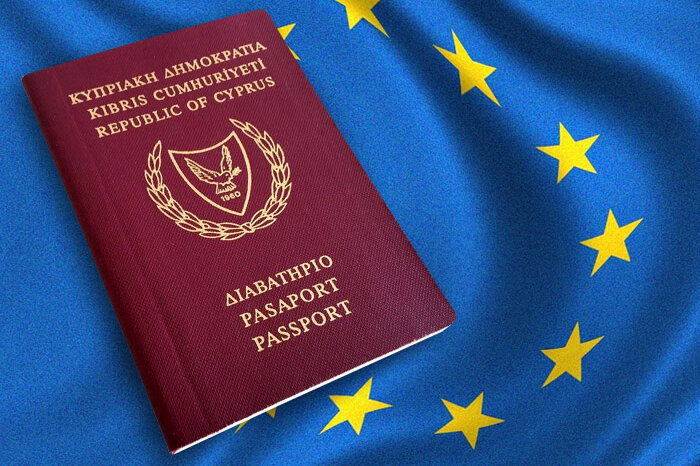It didn’t matter who you were. If you had 2.2 million euros to spare, you could start your life over in Cyprus.
A simple investment could get you a brand new Cyprus citizenship, letting you live anywhere in the EU. Not speaking Greek, not living in Cyprus and having a criminal record or sanctions were no obstacles to buy a master key to Europe. Until recently.
The citizenship-by-investment program, also known as the golden passports scheme, came crashing down in October after Al Jazeera’s investigative report implicated high-level politicians in corruption related to the scheme.
The media outlet found that the program breached Cyprus’s own rules and that at least dozens of people with criminal records may have gotten passports illegally. The scheme was scrapped in October.
Thousands of people benefitted from the scheme in its 14-year history, especially wealthy people from Russia, China and Ukraine. The list included controversial figures like Ihor Kolomoisky, Mykola Zlochevsky and Oleh Bakhmatiuk.
Cyprus has launched an investigation into the program, which may result in some passports being revoked.
“If the recipients obtained the passport by withholding information, then I presume they’ll have an issue,” said financial adviser Charles Caralambous. “Based on my information some passports have been revoked.”
It is not clear how many as the government does not reveal this information. In 2019, it announced plans to revoke citizenships from 26 golden passports’ holders. The names were reported by Cypriot media.
“And you’ll note that Ukrainian nationals were not among them. Due to a legal obstacle, however, the process stalled for months, and it remains unclear whether these people have lost their Cypriot — and, by extension, EU — citizenship,” Eka Rostomashvili, campaigns lead at Transparency International non-governmental organization told the Kyiv Post.
Rostomashvili believes that Cyprus’s response to allegations was quite weak.
“In June 2020, the Cypriot government said that it fixed this loophole but it is still not fully clear if the amended rule could potentially apply retroactively to individuals such as Gennady Bogolyubov and Igor Kolomoisky, who reportedly received their Cypriot passports in 2010 and 2009, respectively,” she added referring to Cyprus’s step to toughen laws.
But the likelihood that the government will zealously investigate the scheme is low, according to multiple observers.
“I don’t think it will be a mass revocation of passports. They will remove some big names of those directly involved in corruption and maybe say that they did not know about that. That is it,” Tetyana Shevchuk, a lawyer with a non-governmental organization Anti-Corruption Action Center, AntAC, told the Kyiv Post.
The government is unlikely to investigate Cyprus’s top law firms, which get golden passports for their clients, because they are very politically connected, believes Stalios Orphanides, a reporter with the Organized Crime and Corruption Reporting Project (OCCRP).
“The government has several members who are linked directly or indirectly with law and accounting firms or developers that helped foreigners buy passports,” Orphanides, who investigated golden passports, said. “They will surely not want to go after them.”
Among Cyprus’s law firms tied to top officials are the firms of Cyprus president Nicos Anastasiades and former Minister of Justice Giorgios Savvides.
OCCRP has reported on multiple firms, which included the one founded by Cyprus president Nicos Anastasiades, who had been linked to the infamous “Troika Laundromat” international money laundering scheme. The lawyers Kolomoisky relied on in Cyprus include infamous names with ties to Anastasiades.
Even Caralambous, who believes the investigation will yield results, admits that the country’s top law firms are very well connected and have a lot of power.
Ukrainians in question
Ukrainians are in the top three nationalities by the number of golden passports after the Chinese and Russians, according to Cypriot authorities.
One of them is oligarch Igor Kolomoisky.
The Kyiv Post got a leaked spreadsheet listing some of the names of golden passport owners. A Cypriot lawmaker put together the file a few years after the scheme was introduced in 2007.
According to the document, Kolomoisky and his wife Iryna got “golden passports’’ in 2010. Kolomoisky also has Israeli citizenship and a residence permit to live in Switzerland.
One of Ukraine’s richest men, Kolomoisky is a former owner of PrivatBank, the largest lender in the country. In 2016, the state nationalized the bank after Kolomoisky and his partners were alleged to have stolen $5.5 billion from its balance and hid it overseas.
The vast majority of the money was laundered through PrivatBank’s Cyprus branch, according to investigations by Kroll Inc, the National Bank of Ukraine and investigative journalists. Kolomoisky denied money-laundering allegations.
A few of Kolomoisky’s friends also have golden passports, including the first deputy chairman of the board of PrivatBank, Timur Novikov and Kolomoisky’s main business partner Gennadiy Bogolyubov.

(R to L) Mykola Zlochevsky, Ihor Kolomoisky, Gennady Bogolyubov, Vadim Shulman, Konstantin Grigorishin and Oleh Bakhmatiuk. (Kyiv Post)
Even Kolomoisky’s friend-turned-rival enjoys the benefits of the golden passport. Tycoon Vadim Shulman, was a close friend and business partner of Kolomoisky until their relationships turned sour in 2012. Shulman has been under investigation for alleged money laundering since 2019. He denies the changes.
Other controversial Ukrainians who got the golden visa included fugitive energy official Mykola Zlochesky, owner of Burisma Holding, and agricultural tycoon Oleh Bakhmatiuk, who was on the 2019 list for alleged financial crimes.
The lawyers acting for Kolomoisky and Bogolyubov confirmed to The Guardian that their clients had Cypriot citizenships.
Shulman told the Kyiv Post he has a golden passport, too.
Russian-Ukrainian businessman Konstantin Grigorishin reportedly bought citizenship. He had been accused of benefiting from ties with presidents Petro Poroshenko and Viktor Yuschenko. Donetsk industrialist Vitaliy Gaiduk and his wife Olena have citizenships as well.
The Kyiv Post could not reach Novikov, Grigorishin, Gaiduk, Zlochevsky and Bakhmatyuk before publication.
The investigation
In November 2019, the government appointed a special three-member committee to investigate whether any of the golden passport buyers were involved in financial crimes.
The committee sorted 2,803 applications received from 2008 to 2018 into two categories, high and medium/low risk and closely examined the filings of 42 investors.
In its findings, the committee recommended the Interior Ministry to strip seven investors of citizenships immediately and consider revoking citizenships from 12 more people.
Soon after the report came out, Cyprus President Nicos Anastasiades said that the seven passports would be revoked. It’s impossible to confirm whether he kept his word.
It took the investigators a year to produce the report. The government released a redacted version of it in December. The Kyiv Post obtained the original, full version. In it, the committee details the failures of the Cyprus governing bodies to control the application process.

Cyprus became infamous for selling out its citizenships to wealthy people with questionable reputations.
The Interior Ministry often did not check the applicants’ backgrounds and the sources of their wealth.
In one instance, the Cyprus authorities ignored glaring evidence of money laundering when handing a golden passport to Jho Low, a notorious Malaysian businessman wanted at home and abroad for allegedly looting $1 billion from Malaysian State Investment Fund. Cyprus’ money-laundering unit knew that but did nothing to stop him from getting his citizenship.
Another investor paid over 3.2 million euros ($3.9 million) for his golden citizenship by credit card. He made 25 transactions within just 30 minutes without raising red flags in the bank. He did so, the committee believes, to bypass the 150,000 euro limit for one-time transactions from the country.
According to the report, one investor used two different names and unsuccessfully tried to open bank accounts with each of them. The lawyers, helping this person to get the “golden passport,” seemed well aware of the fraud.
Some legal firms providing services were either aware of their clients’ shady business or did not check their backgrounds, including global auditor PricewaterhouseCoopers. PWC once audited PrivatBank and failed to detect the fraud scheme eventually exposed by the National Bank of Ukraine and Kroll Inc.
Sometimes service providers helped their clients launder money through investment in real estate. They chose a property and gave it a price tag that met the investment criteria regardless of its real value. In one case, the “investor” bought a mansion for 5.5 million euros while the market price of that house stood at 800,000 euros.
The Finance Ministry did not check whether the amount invested corresponded with the real value, the report states.
The Interior Ministry did not verify the applicants’ recommendation letters and accepted questionnaires with misleading or false information. The vast majority of applicants left the field regarding previous convictions blank and it did not seem to bother the Ministry, according to the committee’s conclusions.
After granting the golden passports, the Ministry did not monitor the passports holders for criminal activity.
A wider, more in-depth probe of more than 6,000 investors and their relatives who received a Cyprus passport since 2013 is being conducted by the attorney general himself.
New inquiry
Yet another new investigation has now launched to cover the period from 2007 through July 31, 2020.
Among other nations, the probe is looking into Ukrainians. The new interim report will be released in mid-March 2021.
In September 2020, Attorney General Giorgos Savvides appointed the new team of investigators.
Myron Nikolatos, the President of the Supreme Court was appointed its chairman. Former Supreme Court judge Costas Pambalis, Deputy Auditor-General Kyriacos Kyriacou and Financial Ombudsman Pavlos Ioannou are the other three members.
However, there are concerns about the probe’s impartiality.
Savvides, who appointed the members of the committee, used to serve as justice minister from May 2019 to June 2020 and had a say over approving golden passports.
Nikolatos’ leadership also raises questions. Cyprus’s former Attorney General Costas Clerides openly accused Nikolatos of making decisions that benefited his family members while he still led the Supreme Court.
The Supreme Court in December 2018 acquitted Bank of Cyprus executives who were jailed for securities fraud. Three out of five judges in the appeal case had children or spouses employed by the law firm Chryssafinis & Polyvious that represented the bank and its executives. The attorney general said that Nikolatos’ daughter and sister benefited from a settlement with the bank.
The Supreme Court under Nikolatos rejected the accusations.
EU launches legal action
A week before Cypriot authorities announced that they would scrap the “golden passports” scheme, the European Commission had launched an infringement procedure against Cyprus for selling the EU citizenships.
It was not an impulsive decision.
The Commission had previously expressed concerns about the golden passport scheme a number of times saying that such a practice poses serious security risks to the EU with money laundering, tax evasion and corruption.
This time the European Commission was even more straightforward. It called such a scheme the one that “undermines the essence of EU citizenship” and affects not only the states that grant them but also the EU as a whole.
“The person concerned automatically becomes an EU citizen and enjoys all rights linked to this status, such as the right to move, reside and work freely within the EU, or the right to vote in municipal elections as well as elections to the European Parliament,” a statement on the European Commission’s website says.
Cyprus had two months to respond to the EU’s complaints.
“Cyprus has replied to the Commission’s Letter of Formal Notice sent on 20 October 2020. We are now analyzing the reply and will then decide on the next steps,” Katarzyna Kolanko, a press officer of the European Commission told the Kyiv Post.
“We do not comment on the ongoing infringement procedures,” her written response reads.
There are a few options of what can happen next.
If the replies are not satisfactory, the Commission can take the case to the European Court of Justice, the highest court of the EU. If the court finds the member state to be violating the EU laws, it can impose financial penalties.
